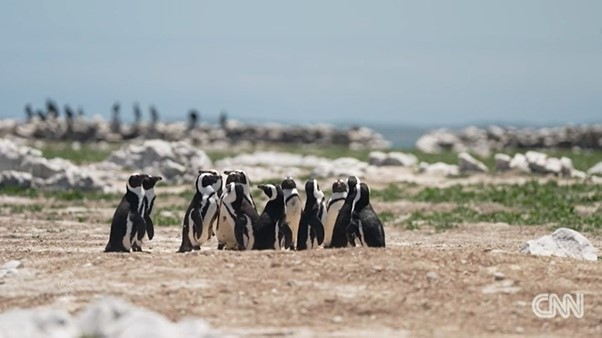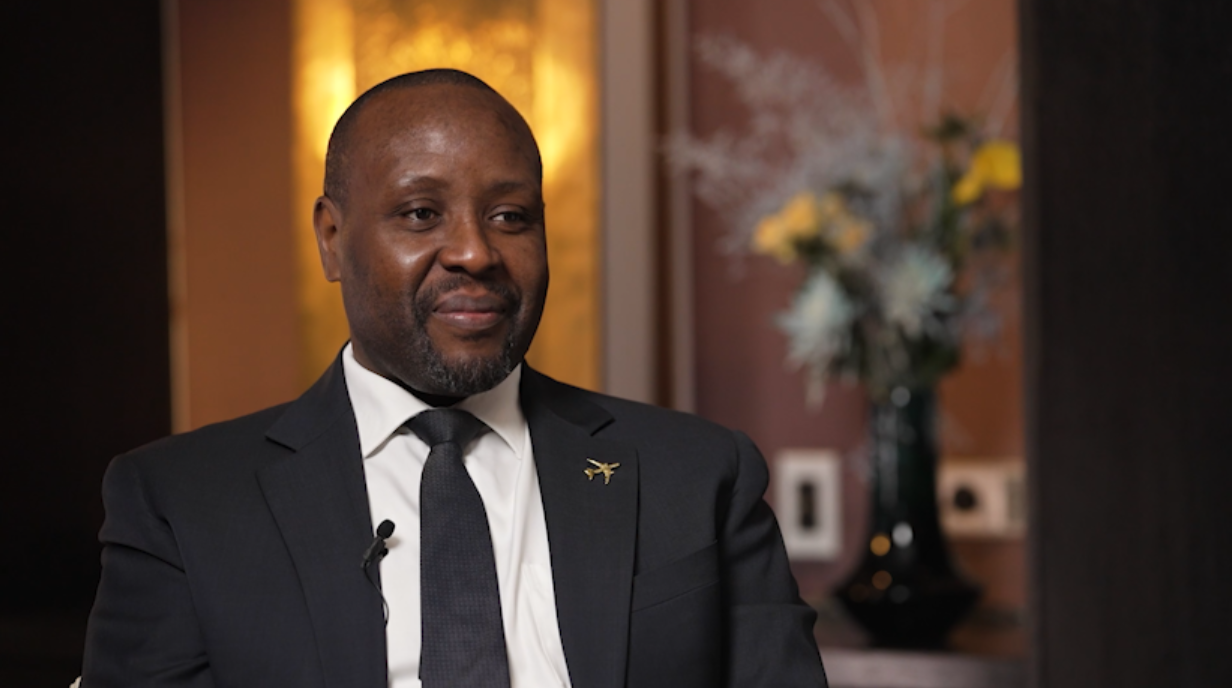Opinion
A new variant highlights old problems

By Eleni Giokos, Anchor & Correspondent, CNN
At the end of last week, I wrapped up the last of my work commitments in Johannesburg and prepared to head to the airport, ready to return to my new home in Dubai.
I’d been presenting an awards ceremony for journalists in South Africa and lamenting the fact that ongoing Covid precautions meant that we’d had to do it virtually. Even though I’d been able to dress up for the occasion (in a dress with pockets, no less!), it had felt strange to be back in this constrained environment having become used to the freedom many of us have begun to enjoy as restrictions ease.
A week earlier I had been standing on various stages at the Intra-Africa Trade Fair in Durban, attended by around 15,000 people with renewed optimism. It felt like a reunion. Executives and policymakers whom I hadn’t seen in person in two years, all bright-eyed about Africa’s resilience and ready for a more integrated, powerful continent.
I moderated numerous panel discussions but one in particular stood out: how tourism will help kickstart Africa’s economy. All the talk there was about how the world is finally emerging from the shadow of Covid, and perhaps we could finally look forward, rather than back. As I packed my bags in Johannesburg those words were ringing in my ears when I heard the news that, due to the Omicron variant, I wouldn’t be going anywhere.
What I hadn’t priced in was the aggressive and swift imposition of travel bans. The UK kickstarted a cascade of falling dominoes as countries quickly placed South Africa and neighbouring countries on their red lists.
I soon realised that by sleeping on the news my exit strategy had crumbled. Dubai had expedited its own ban and direct flights were cancelled altogether, while flights to other possible gateway ‘safe country’ quarantine destinations filled up almost immediately. It was complete chaos, with people left at the airport with very little certainty about what was to come, and prospects of any kind of travel diminishing by the hour.
I was in many ways among the lucky ones. I was able to stay with family, set myself up to continue working, and report for CNN on what rapidly became the biggest story of the week. But being part of that story in a literal sense gave me an intimate perspective on what was going on, and I’ll admit, a sense of disbelief at how events had played out.
South Africa has been praised for its efforts in genomic sequencing, an area in which it truly excels, as well as its transparency in alerting the world to the presence of this new variant; but it has also been, many have argued, punished for both.
As we know from the discovery of a number of past variants, just because one has been discovered somewhere, does not mean that it originated there. As we have since found out, Omicron already exists in many other countries, including the UK, which was the first to ban travel from South Africa. The latest reporting even confirms that Omicron was in Europe, in the Netherlands, before it was flagged by South Africa.
Travel restrictions might appear to be a logical step in containing these new variants, but as CNN’s senior medical analyst, Dr Jonathan Reiner, said on Monday, they may offer “an illusion of protection.” As Dr Reiner put it, “it’s like locking a screen door. You feel like you’ve done something to protect yourself, but you really haven’t.”
It is also difficult to escape the notion that this latest series of travel bans unfairly targets African nations. Even the WHO called for borders to remain open, its regional director for Africa, Matshidiso Moeti, saying on Sunday that the bans targeting Africa “attack global solidarity”, and “exploit our divisions.”
In tandem with all of this is the ongoing conversation about vaccine inequality, which the global south has been pressing wealthier nations on for many months now. With less than 25% of its population fully vaccinated, South Africa lags well behind much of the world, according to Our World in Data. While the United States, with over 59% of its population vaccinated, and the UK, with almost 69%, are busy distributing booster shots, how to get first vaccines into the arms of South Africans remains extraordinarily challenging.
Another way of looking at these statistics – the number of actual doses given – is even more stark. The USA has given 459 million vaccine doses to its population. China an incredible 2.33 billion. By contrast, South Africa has given just 25.4 million.
We know, because we have been warned time and time again, that the greatest threat to the global recovery from Covid-19 is the unvaccinated. It is among this population that mutations are occurring. It is these people, whether by choice or by accident of birth, who are endangering any kind of return to normal life. So why do so many African countries lag so far behind the world when it comes to vaccinations, and what can be done to change that?
One possible opportunity is local manufacture. There has to date been considerable resistance to sharing vaccine patents, particularly from the European Union. On Monday, nursing unions in 28 countries around the world called for the temporary waiver of patents for Covid vaccines. Their plea, via a letter to the UN, called the distribution of vaccines unjust and blamed it for “staggering numbers of deaths”. US President Joe Biden also joined a call to the WTO to waive the Trade-Related Aspects of Intellectual Property Rights (Trips) agreement in regard to vaccines last Friday.
Placing manufacturing in the hands of local companies at least removes a significant step from an already complex supply chain. Janssen Pharmaceuticals, part of Johnson & Johnson, this week announced a deal with South Africa’s Aspen Pharma, which will enable Aspen to sell the J&J vaccine to African countries under its own brand. This feels like an important moment, and a start.
The idea of waiving patents for life saving drugs takes me back to the HIV AIDS epidemic, when people in Sub Saharan African were dying at an alarming rate, while pharmaceutical companies held tightly onto IP rights of antiretrovirals. When treatment cost thousands of dollars, poorer nations simply couldn’t afford to save their people. After much negotiation – I’m told by some close to the talks, more akin to begging – pharma companies relented and allowed generic drug makers to reverse engineer ARVs for the African market. It was a game-changing moment.
There remain major logistical and psychological challenges beyond local manufacture and patent sharing, of course. Vaccine hesitancy is a persistent and difficult obstacle to overcome in South Africa, and transport and refrigeration are major issues in many African countries.
Sitting here in Johannesburg, scanning the newswires and consulting with travel agents as I look to somehow make it back to the UAE, I’m also struck by a wider lesson here, one that we were supposed to learn from Covid, and clearly have not.
The pandemic was supposed to be an opportunity for us to come together, united against a common foe. It has produced extraordinary tales of bravery, ingenuity and resilience, as well as profound loss and tragedy; but it has also exacerbated divisions and turned many of us inward.
last week, South Africa reported its unemployment rate is 35%. That’s a third of the population without work. The expanded definition takes unemployment to 45%. The hardest hit sectors are hospitality and tourism.
Yet another warning that the world must pay attention to comes from the UN: that more African countries will be plunged into poverty thanks to these latest bans.
The Malawian President says that the bans are Afrophobic. They hold no benefit and will result in immense pain for a continent already desperately trying to recover with resources that pale in comparison to the stimulus packages richer nations were able to deploy. The economic damage will be enormous and cannot be given a quick fix.
At a national level, last week has been a reminder of just how far apart we are, and how quickly nations close the door rather than stretch out a hand. It has also been a reminder of how old prejudices and inequalities run deep. One thing seems certain: we will not end this pandemic if we do not change the way we fight it, and we must do that together.
Africa is a resilient continent and used to fighting through challenges, but with such an abundance of global resources, it doesn’t need to suffer this acutely. This time the stark global inequities that divide us cannot be ignored – African leaders are more vocal than ever. And Africans may not forgive being forgotten.
Eleni Giokos anchors Connecting Africa and Marketplace Middle East on CNN International





You must be logged in to post a comment Login